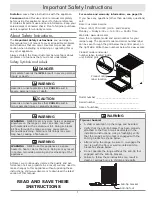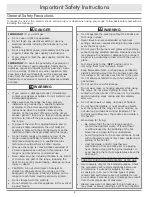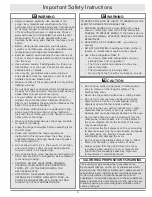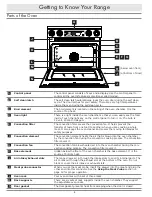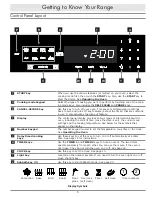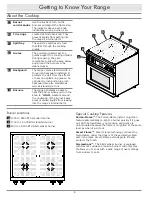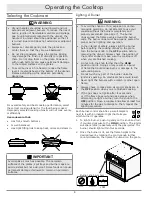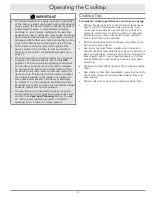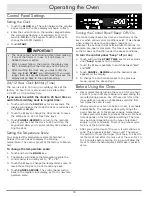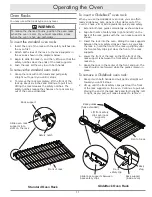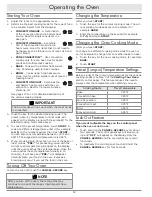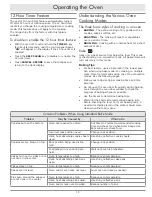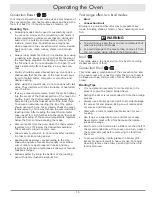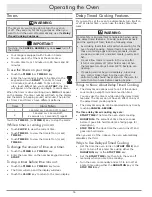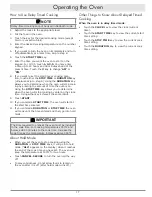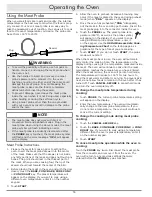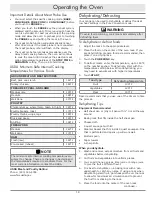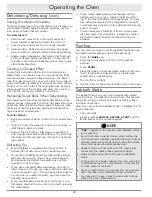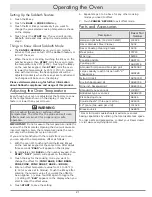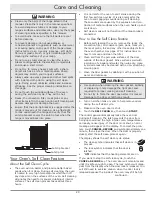
8
Selecting the Cookware
WARNING
• Utensil handles should be turned inward and not
extend over adjacent burners. To reduce the risk of
burns, ignition of flammable materials and spillage
due to unintentional contact with the utensil, the
handle of a utensil should be positioned so that it
is turned inward and does not extend over adjacent
burners.
• Always set utensils gently onto the grates and
center them so that they are well-balanced.
• Do not drag cookware across the grates. Sliding
may damage the finish. Lift utensils to reposition
them. Do not drop them on the grate. Cookware
with rough bottoms can cause permanent damage
to the coated surfaces on the grates.
• To avoid burns or a fire hazard, reduce the flame
level if it extends beyond the bottom of the utensil.
Flames extending up the sides are potentially
dangerous.
For overall safety and best cooktop performance, select
the correct cooking utensil for the food being cooked.
Improperly selected cooking utensils will not cook evenly
or efficiently.
Use cookware that:
• Has flat, smooth bottoms.
• Is well balanced.
• Has tight fitting lids to keep heat, odors and steam in.
IMPORTANT
Avoid spills as much as possible. The porcelain
surfaces of the grates, spill trays and burner caps are
acid-resistant but not acid-proof. Some foods can cause
permanent damage if allowed to remain on porcelain
surfaces.
Operating the Cooktop
Lighting A Burner
WARNING
• To avoid the chance of fire, explosion or carbon
monoxide poisoning, do not attempt to use your
cooktop without the burners completely and
properly assembled (see page 7). The burner
rings spread the flame evenly around the burner
caps. The burner rings must be properly seated for
proper burner lighting and operation.
• In the interest of safety, always light the burner
before putting the cooking utensil on the grate.
Turn the burner knob to the
OFF
position before
removing the utensil. Always check the position of
the control knobs to make sure the cooktop is off
when you are finished cooking.
• Do not turn the knob farther than the
HIGH
position until lit. Doing so may result in a burst
of flame that could cause burns or damage to the
surrounding area.
• Do not touch any part of the burner while the
igniter is sparking. An electrical shock could result.
• Never light the burners with a match or other open
flame.
• Always check to make sure all control knobs are in
the
OFF
position when you are finished cooking.
• If the gas does not ignite after four seconds
or if the flame goes out and gas escapes when
attempting to light a burner, turn the knob to the
OFF
position. Open a window and allow at least five
minutes for the gas to dissipate. Then, repeat the
lighting procedure.
Each burner control knob has a small diagram
next to it with an indicator light that tells you
which burner it operates.
1. To light a burner, push in gently on the knob and turn
it counter-clockwise to the
HIGH
position. The igniter
will spark (click) repeatedly until the gas ignites. The
burner should light within four seconds.
2. Once the burner is lit, set the flame height to the
desired level by rotating the control knob further
counterclockwise, then place the utensil on the grate.
Burner knob symbols
OFF
HIGH
LOW
Содержание Distinctive DR30D
Страница 2: ... 2010 Dacor all rights reserved ...
Страница 34: ...32 Notes ...



